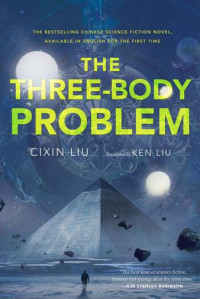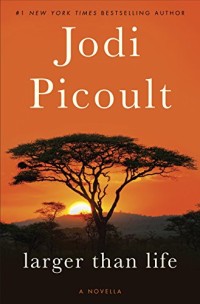Cornwall reads in brief
Yes, I’ve been on holiday again. This time a long weekend in Cornwall. It wasn’t what most people might consider beach weather, but that just provided an excuse to stay indoors reading while looking out at the sea and listening to the waves crash. (It’s a comforting noise, which possibly doesn’t make any sense.)
It was a lovely holiday with old friends in a place we have visited many times, so it’s like a home from home. I didn’t actually have my nose in a book the whole time – there were beach/clifftop walks, games to play, crosswords to complete, a whole lot of tasty food to eat and even (in my case very briefly because brrr) swimming in the sea.
But I did get a lot of reading done too.
 The Three-Body Problem
The Three-Body Problem
by Liu Cixin
translated by Ken Liu
This was not a light holiday read, but I’m glad I had long relaxed hours to devote to it. It’s…heavy. Ye Wenjie suffered greatly in the Cultural Revolution. As a physicist, she was cast out from her life along with all the other intellectuals and sent to work in a remote forest to be rehabilitated. But the government had other plans for her, plans that made use of her physics specialism. Skip forward to the present day (ish) and some strange happenings are afoot. High-profile scientists are killing themselves, experiments are returning impossible results and a computer game called Three Body has become a minor craze. Xiao Wang is a nanomaterials researcher pulled into this bizarre situation for reasons that take a while to become clear.
It’s hard to say much more without thoroughly spoiling the plot. Most reviews I’ve read have mentioned details from the latter third of the book because that’s when the plot starts to tie together and make some sense, but I’m not going to do that here. (If you know what the Three Body Problem is in physics you’ll have some clue.) There is some hardcore physics here, not to mention politics. But there are also complex characters, with moving human stories and an abundance of grey areas. Ye’s story was more compelling for me than Wang’s, but it is him we follow for most of the book, as it gradually turns from political history to pacy thriller. An uneasy combination.
“Her heart was like ashes from which the flame of love could never be lit. As she pondered human nature, Ye was faced with an ultimate loss of purpose and sank into another spiritual crisis. She had once been an idealist who needed to give all her talent to a great goal, but now she realized that all that she had done was meaningless, and the future could not have any meaningful pursuits, either.”
First published 2008 by Chongqing Press.
This translation published 2014 by Tor Books.
Source: Amazon.
My Cousin Rachel
by Daphne du Maurier
Now this was much more like it. Not that this is a light happy read at all, but it didn’t involve complex physics and it did have an appropriate Cornish setting! I’ve realised I have quite a lot to say about this book so I’ll write a proper review soon, but for now here’s a picture of the copy I read along with just some of the other quality books at the holiday home:
Sonnets from the Portuguese
by Elizabeth Barrett Browning
A complete opposite to the Du Maurier, I find I have very little to say about this small volume of poems. Perhaps I read it too fast, or perhaps I’m still not very good at poetry. Probably both. There are a couple of famous poems here, most notably “How do I love thee? Let me count the ways”, and all 44 are in that vein: romantic poems addressed to a lover. They are quite overblown, in classic romantic style – declarations of love until and even beyond death, for example – but they are also very religious. And that’s where they almost lose me. I understand that for people who have faith, it’s often a big part of everything in their lives, including their romantic love, but I’m afraid I am put off by such conflation. That said, I find the heartfelt outpourings endearing, speaking to the teenage passion in me, and I suspect if I had read these when younger I would have been thrilled.
“Who can fear / Too many stars, though each in heaven shall roll, / Too many flowers, though each shall crown the year? / Say thou dost love me, love me, love me – toll / The silver iterance! – only minding, Dear, / To love me also in silence with thy soul.”
First published 1850.
Source: Project Gutenberg.
Challenges: This counts towards the Rory Gilmore Reading Challenge.
 Larger Than Life
Larger Than Life
by Jodi Picoult
I think I might quite like Jodi Picoult. She’s very readable, but not in a fluffy girly sort of way (not that there’s anything wrong with fluffy and girly, it’s just not at all my thing). This is a novella, or perhaps even a novelette, that was released as a free e-book prequel to her novel Leaving Time. I’m glad I didn’t know that beforehand as I would have been annoyed at it being essentially a marketing ploy, but it turned out to be a genuinely good read, so I shall in turn reassure you not to be put off!
Alice is an animal psychologist studying elephants in Africa. As the story opens, she comes across a herd that has been slaughtered by poachers – all except for one baby elephant. Though she knows it is breaking all the usual rules, she determines that she cannot let the calf die. At the same time, she is reflecting on her fraught relationship with her mother and on the nature of memory – the core of her interest in elephants.
It tugs at the heartstrings big time, and the parallels between her playing mother to an elephant and her own mother–daughter relationship are perhaps a little over-obvious, but it’s well written enough that neither was a problem for me. It’s fairly rare to have a female scientist as a lead character and I liked spending time with Alice. In fact, the marketing ploy has totally worked on me as I really want to read Leaving Time to see how her story continues!
“By suggesting some sort of pachydermal post-traumatic stress disorder, I knew I was straddling a very fine line between science and anthropomorphism. Science was about magnification – examining an organism in such detail that you understood it on a cellular, biological, evolutionary level. Although it was widely accepted that elephants exhibited signs of cognition…no scientist would go on record to say that these great grey animals felt as deeply as we did. Emotions were not quantifiable – not in humans, and not in elephants.”
Published 2014 by Ballantine Books.
Source: Amazon.


I like to read about a place when I’m in a place. It sounds like you had a good time, even though the weather was not good.
Here’s my Sunday Salon!
Yes, I try to read about the place I’m holidaying in, though I don’t always manage it. On one of our Cornwall holidays I found a secondhand copy of a travel guide to Cornwall written by Daphne du Maurier, which was the most perfect fit possible!